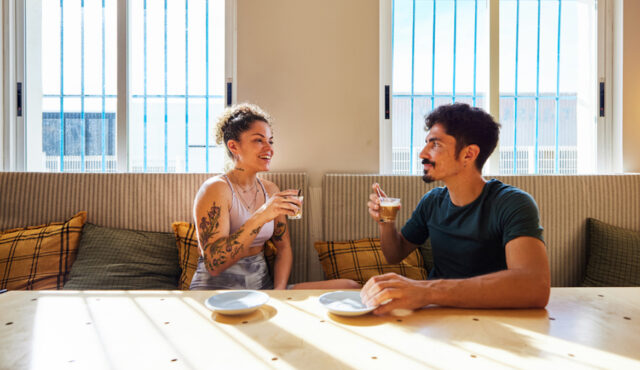Essentially, stack dating is the act of adding (hence, “stacking”) a date right onto the existing obligations of your calendar or scheduling back-to-back dates—rather than setting aside a full evening or weekend day for any given date—in an effort to make dating less stressful, explains dating coach Megan Weks. And it’s gaining ground among Gen Zers: 51 percent of Gen Zers surveyed in the 2023 Tinder Future of Dating report said they’re actively looking for ways to fit dating into their daily schedules, and 32 percent have even gone on a date during their workday.
While packing your calendar with meetups may not seem particularly chill, the idea behind it is actually pretty genius. You see, with traditional dating, you might typically devote an entire evening to one person… which can feel like a particular waste of time and a big letdown if it doesn’t work out, Weks explains. Stack dating, on the other hand, is all about finding the right person by exploring more potential partners more quickly and fitting low-pressure dates—like a quick coffee after your weekly yoga class—into your existing routine, she says.
“This approach takes the edge off of dating because each date [doesn’t feel like] a big romantic ordeal.” —Megan Weks, dating and relationship coach
“This approach takes the edge off of dating because each date [doesn’t feel like] a big romantic ordeal,” says Weks. “Instead, you’re finding natural breaks in your day and having a brief meeting to determine if there is enough baseline attraction and conversation chemistry to invest more time into a longer date in the future.”
In this way, stack dates are like meet-and-greets to determine if a romantic spark may be present. If there’s something there, a second or third date could be a longer, more traditional date, Weks explains. But if not? Then at least you haven’t invested the time, energy, and perhaps money of a full-fledged first date into that ill-fated meeting. Nor have you suffered the opportunity cost of having (re)scheduled your day or night around this person.
In practice, stack dating might look like having a date during your lunch hour or meeting up for a drink before heading to dinner with friends, says sex therapist Janet Brito, PhD, founder of The Sexual Health School, an online training program for health-care professionals seeking human sexuality training.
Another approach is stacking dates so you’re only meeting potential partners when you know you’ll feel your best. “I saw a TikTok where one woman shared that she feels completely disinterested in going on dates near the end of her menstrual cycle, so she stacks dates on the weeks when she knows she will feel social and excited to get out of the house,” says Weks. TL;DR? There is really no wrong way to stack date. It’s whatever feels right for you.
Where did this dating trend come from?
A desire to remove dating as a source of stress is likely what’s driving so many Gen Zers toward stack dating, according to Weks. After all, this is the generation most likely to report negative feelings of stress and anxiety. And in taking some of the pressure off scheduling and attending dates, stack dating may help young people to “take their serenity seriously,” says Weks.
Given that Gen Z is also the generation perhaps best known to value authenticity—after growing up in the hyper-filtered world of social media—Gen Zers may also be stacking dates to keep things real. When you’re just fitting dates into your everyday life, there’s less risk that you wind up changing any element of yourself while on the dates.
That said, “this way of dating is not necessarily as fresh as Gen Z may think,” says Weks. “Stack dating takes some aspects from the courtship model of how people used to date three or four generations ago, [with primarily] casual meetings, but not in a way that suggests casual sex.” Stacking dates, then, might just be a modern tack for no-fuss dating—or dating in a way that doesn’t involve all the hullabaloo (read: preparation, effort, and energy) with which it’s come to be associated.
What are the pros and cons of stack dating?
While stack dating may sound pretty great at first blush, it’s certainly not a one-size-fits-all solution; as much as it can serve the schedule and goals of one person, it can also prove mentally and emotionally draining for another.
On the one hand, if you like being spontaneous, you may not love having such a tightly packed schedule, and if you’re introverted, you may be socially exhausted by meeting new people back-to-back, says Dr. Brito. But on the other hand, if you’re very busy but still interested in meeting someone, or you tend to feel overwhelmed by dates that feel like a whole thing, stack dating may invigorate you.
Not sure if stack dating would work in your favor? Weks and Dr. Brito recommend considering the below pros and cons before jumping into it.
Stack dating pros
- It stacks the odds in your favor. Going on shorter dates means you’ll have time to meet up with more people. And the more people you meet, the higher the chance, statistically speaking, that you’ll click with someone you want to see again. Interfacing with more people can also help you clarify for yourself what you’re actually looking for in a romantic partner (and what you’re not), which can help you avoid wasting time dating folks who don’t fit the bill.
- It makes dating less of a production. Primping for a date can take forever and be a major source of stress. (What should I wear? Should I get a blow-out?) But with a stacked date, you’ll likely already be dressed for whatever else is on the docket for your day. So not only are you saving time on the date itself, but also, you could potentially spare time, energy, and stress ahead of the date, too.
- It makes dating more efficient. Though it might not seem like the most romantic thing to pencil dates into your calendar like you would quick meetings, the realities of life can make stacking dates especially functional. Just like you might go on an “errand date” with a friend to get something done while hanging out, you can stack a date into your day to meet a romantic prospect without derailing your schedule.
- It can boost your confidence. By meeting potential partners more often, you can become a more confident dater, which can, in turn, make dates less stressful.
- It makes it easier to date as your authentic self. By coordinating dates around your other commitments (like the gym, work, or lunch with friends), you’re more apt to show up as your natural self—which can help weed out people who aren’t a good match from the jump.
- It can keep you from mentally investing too soon. When you’re meeting lots of potential matches or spending less time with a particular person, you’re also less likely to put all your proverbial eggs in a single basket. And by keeping your options open until there’s real traction with one of your dates, there’s a better chance that you’ll wind up dating someone who’s compatible with you.
- It gives you an easy out. No spark? No problem. When you plan for shorter dates and set clear time boundaries, it’s easier to make an excuse to leave without worrying about hurt feelings.
- It can be fun. Remember, dating is supposed to be a good time! Going on lots of mini-adventures can be more enjoyable than attending fewer lengthier dates, especially if you’re not bringing stress and anxiety along as a third wheel.
Stack dating cons
- It may lead to dating burnout. If you’re using any downtime in your schedule to stack dates rather than recharge, you may start feeling mentally drained. It’s important to know when you have the energy to orchestrate a date as a part of your routine, and not to over-stack when you’re feeling run down.
- It can cause overwhelm. Juggling too many dating prospects at once can make it tough to remember key details and also limit your capacity to deepen any given one of these connections.
- It leaves you with less time to spend with matches. When you have back-to-back dates scheduled or have only allotted a short time for a given date, you may feel bummed if you really hit it off with someone and then have to run to your next engagement.
How to best approach stack dating
If you’re used to setting aside a full evening or afternoon for a first date, proposing a shorter date can be a total fish-out-of-water moment. In this scenario, it’s important to communicate your desires without making your date feel like they’re just another item on your do-to list.
“With anything in life, expressing and setting intentions will pave the way for everyone involved to remain feeling good,” says Weks. To set your date’s expectations, Weks recommends saying something along the lines of: I like to keep initial meetings brief so both people can feel things out before we spend more time together. What do you think? This way, you’re expressing how you want things to go and also checking in with your prospective date about how they feel, she says.
“Most daters are concerned about time and the expenses related to dating and are happy to meet briefly until a deeper connection is established.” —Weks
While it may feel tough to set such definitive boundaries at first, your date’s response may pleasantly surprise you. “Most daters are concerned about time and the expenses related to dating and are happy to meet briefly until a deeper connection is established,” says Weks.
Reaffirming your boundaries when you first get to the date is also a smart idea. Weks suggests reminding your date of how much time you have upon meeting up. “Without a reminder, the other person may feel like you’re abruptly cutting things short and take it personally,” she says.
When you’re both on the same page, however, a stacked date can be just the thing to establish your connection… or figure out that you’re not a match and move on, no love (nor much time or energy) lost.









